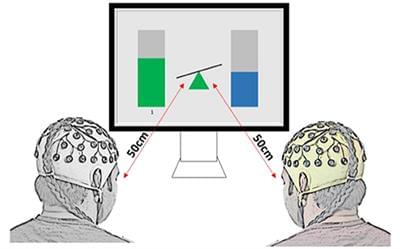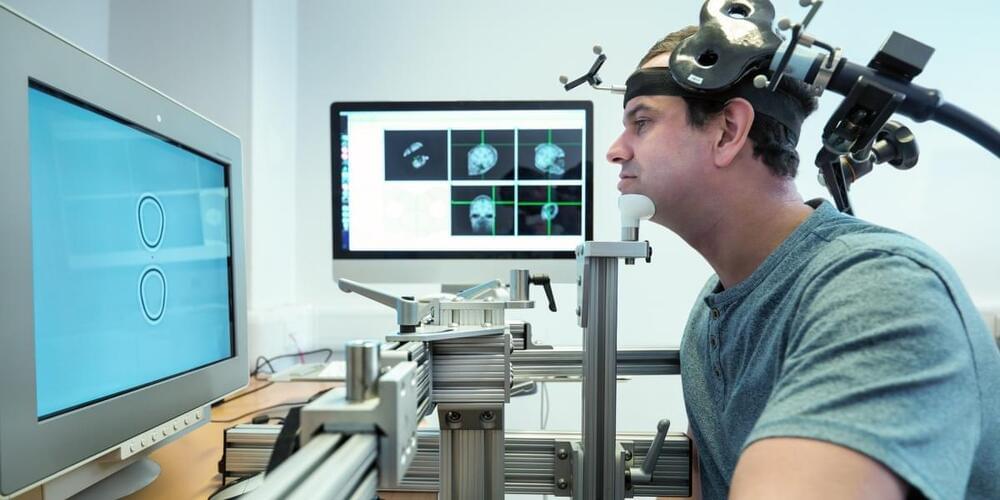Brain computer interface. People even so called experts are so narrow they have lobotimized their vision.
Share your videos with friends, family, and the world.
Brain computer interface. People even so called experts are so narrow they have lobotimized their vision.
Share your videos with friends, family, and the world.

A team led by UCL and UCLH researchers have mapped the parts of the brain that support our ability to solve problems without prior experience—otherwise known as fluid intelligence.
Fluid intelligence is arguably the defining feature of human cognition. It predicts educational and professional success, social mobility, health, and longevity. It also correlates with many cognitive abilities such as memory.
Fluid intelligence is thought to be a key feature involved in “active thinking”—a set of complex mental processes such as those involved in abstraction, judgment, attention, strategy generation and inhibition. These skills can all be used in everyday activities—from organizing a dinner party to filling out a tax return.

Although genetically modified foods still get a bit of a bad rap, there are actually many good reasons why modifying an organism’s genetics may be worthwhile. For example, many breeds of genetically modified foods have made them more resistant to disease.
It’s also possible to modify foods to make them more nutritious. Take, for example, golden rice. This grain was engineered to have higher levels of vitamin A in order to tackle deficiencies of this nutrient in impoverished countries.
A purple tomato, created using genetic modification, may be available to buy in the U.S. as soon as 2023.
South Korea has reported its first death due to Naegleria fowleri or ‘Brain-eating amoeba.’ The amoeba enters through the nose and attacks the brain, causing meningitis. Should you be scared?
#SouthKorea #amoeba #WION
About Channel:
WION The World is One News, examines global issues with in-depth analysis. We provide much more than the news of the day. Our aim to empower people to explore their world. With our Global headquarters in New Delhi, we bring you news on the hour, by the hour. We deliver information that is not biased. We are journalists who are neutral to the core and non-partisan when it comes to the politics of the world. People are tired of biased reportage and we stand for a globalised united world. So for us the World is truly One.
Please keep discussions on this channel clean and respectful and refrain from using racist or sexist slurs as well as personal insults.
Check out our website: http://www.wionews.com.

PITTSBURGH — A group of neuroscientists led by a University of Pittsburgh School of Medicine researcher developed a test to detect a novel marker of Alzheimer’s disease neurodegeneration in a blood sample. A study on their results was published today in Brain.
The biomarker, called “brain-derived tau,” or BD-tau, outperforms current blood diagnostic tests used to detect Alzheimer’s-related neurodegeneration clinically. It is specific to Alzheimer’s disease and correlates well with Alzheimer’s neurodegeneration biomarkers in the cerebrospinal fluid (CSF).
A group of neuroscientists led by a Pitt School of Medicine researcher developed a test to detect a novel marker of Alzheimer’s disease neurodegeneration in a blood sample.

EEG hyperscanning during multiuser gaming offers opportunities to study brain characteristics of social interaction under various paradigms. In this study, we aimed to characterize neural signatures and phase-based functional connectivity patterns of gaming strategies during collaborative and competitive alpha neurofeedback games. Twenty pairs of participants with no close relationship took part in three sessions of collaborative or competitive multiuser neurofeedback (NF), with identical graphical user interface, using Relative Alpha (RA) power as a control signal. Collaborating dyads had to keep their RA within 5% of each other for the team to be awarded a point, while members of competitive dyads scored points if their RA was 10% above their opponent’s. Interbrain synchrony existed only during gaming but not during baseline in either collaborative or competitive gaming. Spectral analysis and interbrain connectivity showed that in collaborative gaming, players with higher resting state alpha content were more active in regulating their RA to match those of their partner. Moreover, interconnectivity was the strongest between homologous brain structures of the dyad in theta and alpha bands, indicating a similar degree of planning and social exchange. Competitive gaming emphasized the difference between participants who were able to relax and, in this way, maintain RA, and those who had an unsuccessful approach. Analysis of interbrain connections shows engagement of frontal areas in losers, but not in winners, indicating the formers’ attempt to mentalise and apply strategies that might be suitable for conventional gaming, but inappropriate for the alpha neurofeedback-based game. We show that in gaming based on multiplayer non-verbalized NF, the winning strategy is dependent on the rules of the game and on the behavior of the opponent. Mental strategies that characterize successful gaming in the physical world might not be adequate for NF-based gaming.
Humans are social creatures whose behavior and consciousness are heavily shaped by their environment. Hence, it is natural that hyperscanning, a technique which involves simultaneous recording of physiological activity from more than one subject, is used to deepen our understanding of human interaction. In recent years, hyperscanning has been applied to brain activity to shed light on the neurophysiological representation of various types of interpersonal communication. These range from verbal interaction (Pérez et al., 2017; Ahn et al., 2018), leader-imitator (Dumas et al., 2010; Yun et al., 2012), joint attention and joint decision-making (Toppi et al., 2016; Hu et al., 2018), to teaching or playing music in a duet (Sänger et al., 2012; Müller et al., 2013). Moreover, the neurological coupling of mothers and their infants was investigated for positive and negative emotions and their regulation (Reindl et al., 2018; Santamaria et al., 2020).

I wanted to focus on the animal testing portion of the Show and Tell. Neuralink representatives showed us videos of a pig that has a cortex and spinal chip in its body. It also has pin points on joints in its leg that are sending data to the Neuralink scientist. When the scientist stimulates a joint it creates an uncontrolled movement. The pig moves its leg without wanting too, but because someone else wanted it too, the pig did not want to move. That’s the focus of this video.
#neuralink #neuroscience #videoessay #yuvalnoahharari #elonmusk #podcast #neurology
Jeff Lichtman is Jeremy R. Knowles Professor of Molecular and Cellular Biology at Harvard. He received an A.B. from Bowdoin (1973), and an M.D. and Ph.D. from Washington University in St. Louis (1980) where he worked for 30 years before moving to Cambridge (2004). He is a member of Harvard’s newly established Center for Brain Science. Jeff’s research interests revolve around the question of how mammalian brain circuits are physically altered by experiences, especially in early life. He has focused on the dramatic re-wiring of neural connections in early postnatal development. More recently his research has focused on developing new electron microscopy methods to map the entire wiring diagram of the developing and adult brain. One of the principal aims of this “connectomics” approach is to uncover the ways information is stored in neural networks.
In the spirit of ideas worth spreading, TEDx is a program of local, self-organized events that bring people together to share a TED-like experience. At a TEDx event, TEDTalks video and live speakers combine to spark deep discussion and connection in a small group. These local, self-organized events are branded TEDx, where x = independently organized TED event. The TED Conference provides general guidance for the TEDx program, but individual TEDx events are self-organized.* (*Subject to certain rules and regulations)
On January 18, 2013, Caltech hosted TEDxCaltech: The Brain, a forward-looking celebration of humankind’s quest to understand the brain, by exploring the past, present and future of neuroscience. Visit TEDxCaltech.com for more details.
David C. Van Essen is the Alumni Endowed Professor in the Anatomy & Neurobiology Department at Washington University in St. Louis. He has pioneered the use of surface-based analysis methods to characterize the structure, function, development, and connectivity of the cerebral cortex. He is Principal Investigator for the NIH Human Connectome Project, a large-scale effort to map brain circuitry and its relationship to behavior in healthy adults. His physiological and anatomical studies have provided deep insights into cortical functional organization. He has served as Editor-in-Chief of the Journal of Neuroscience, President of the Society for Neuroscience, and Head of the Anatomy & Neurobiology Department for 20 years. He is a fellow of the AAAS and received the Raven Lifetime Achievement Award from the St. Louis Academy of Sciences and the Krieg Cortical Discoverer Award from the Cajal Club.
In the spirit of ideas worth spreading, TEDx is a program of local, self-organized events that bring people together to share a TED-like experience. At a TEDx event, TEDTalks video and live speakers combine to spark deep discussion and connection in a small group. These local, self-organized events are branded TEDx, where x = independently organized TED event. The TED Conference provides general guidance for the TEDx program, but individual TEDx events are self-organized.* (*Subject to certain rules and regulations)
On January 18, 2013, Caltech hosted TEDxCaltech: The Brain, a forward-looking celebration of humankind’s quest to understand the brain, by exploring the past, present and future of neuroscience. Visit TEDxCaltech.com for more details.